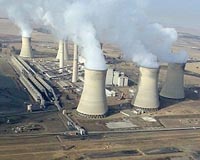| . |  |
. |
Canberra, Australia (UPI) Dec 28, 2010 Recent short-term cooling of global temperatures shouldn't be misinterpreted as meaning an end to global warming, an Australian expert says. Barrie Hunt of the Commonwealth Scientific and Industrial Research Organization says overall global warming is happening despite natural variability that can bring periods where the global climate can be either cooler or warmer than usual "Conclusions that climate is not changing are based on a misunderstanding of the roles of climatic change caused by increasing greenhouse gases and climatic variability due to natural processes in the climatic system," he said. Seasonal cold spells can still be expected under enhanced greenhouse conditions, he says. "Future changes in global temperature as the concentration of greenhouse gases increases will not show a simple year-on-year increase but will vary around a background of long-term warming," he says. This underlying warming trend, he says, will highlight the need to both adapt to what is now inevitable change and mitigate even greater changes.
earlier related report The year ended with modest progress toward a new global deal during UN-led climate talks in Cancun, Mexico, where major emitters including the United States and China moved beyond past bad blood. But US environmentalists' hopes were dashed at home, where a proposal to create a first nationwide "cap-and-trade" plan to restrict greenhouse gas emissions in the world's largest economy died in the Senate. The Obama administration is nonetheless taking action on its own. Starting January 2, US authorities will consider greenhouse gases when approving emission levels for large new industrial plants. The federal Environmental Protection Agency announced on December 23 that it would go a step further starting in 2012 by setting greenhouse gas standards for power plants and petroleum refineries -- which together account for nearly 40 percent of the emissions blamed for climate change. But Obama can expect even more hostility to his climate agenda starting in January, when the rival Republican Party takes charge of the House of Representatives. Representative Fred Upton of Michigan, the Republican who will head the new House Energy and Commerce Committee, said the United States should be "working to bring more power online, not shutting plants down" to protect jobs. "We will not allow the administration to regulate what they have been unable to legislate," Upton said. "This Christmas surprise is nothing short of a back-door attempt to implement their failed job-killing cap-and-trade scheme." The Obama administration insists it is only setting standards, such as favoring green technology, and not imposing numeric caps on emissions as envisioned under most cap-and-trade proposals. The Obama team and environmentalists argue that a shift to green energy would create, not reduce, jobs by opening a new area of growth in the troubled economy. The world's temperature has been steadily rising and many scientists point to rising disasters -- including devastating floods in Pakistan and, counter-intuitively, intense blizzards -- as evidence of climate change. The Democrats narrowly retained control of the Senate and Obama remains president, meaning he can fight any legislative efforts to weaken regulation on climate change. But several Republicans have vowed to fight a key US promise in international negotiations -- to contribute to poor countries seen as suffering the worst effects of climate change. The Cancun conference set up a Green Climate Fund, to which the European Union, Japan and the United States have led pledges of 100 billion dollars a year starting in 2020. Bracing for concerns about accountability, the Obama administration fought successfully in Cancun to put the World Bank in charge of the Green Climate Fund. Todd Stern, the chief US climate negotiator, said the financial pledges were "extremely important" and "a core part of the deal." "Obviously, the fiscal situation is exceedingly tough in the US. It's tough in Europe and other places as well. And we are going to have to do the best we possibly can to carry out" the promises, Stern said. As part of a future deal, the United States has pressed for fast-growing emerging nations such as China to agree to binding and verifiable action on climate change. India surprised many other countries in Cancun when it said it would consider a future binding deal. China has reiterated its opposition but promised to show flexibility. Despite the shift in Washington, California -- the most populous state -- approved its own cap-and-trade system after voters rejected a referendum supported by the oil industry to suspend air pollution control laws. By contrast, oil-producing Texas -- the biggest carbon polluter -- has refused to abide by federal guidelines on emissions, leading the Obama administration to take over its permit system.
Share This Article With Planet Earth
Related Links Climate Science News - Modeling, Mitigation Adaptation
 Japan postpones launch of emission trading system: reports
Japan postpones launch of emission trading system: reportsTokyo (AFP) Dec 28, 2010 Japan on Tuesday postponed the creation of a greenhouse gas emission trading system by a year until after April 2014 in the face of strong resistance from the business lobby, news reports said. The centre-left government of Prime Minister Naoto Kan had planned to launch the system - in which companies would essentially buy and sell 'licences to pollute' - in the fiscal year starting in Apr ... read more |
|
| The content herein, unless otherwise known to be public domain, are Copyright 1995-2010 - SpaceDaily. AFP and UPI Wire Stories are copyright Agence France-Presse and United Press International. ESA Portal Reports are copyright European Space Agency. All NASA sourced material is public domain. Additional copyrights may apply in whole or part to other bona fide parties. Advertising does not imply endorsement,agreement or approval of any opinions, statements or information provided by SpaceDaily on any Web page published or hosted by SpaceDaily. Privacy Statement |